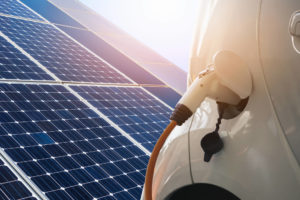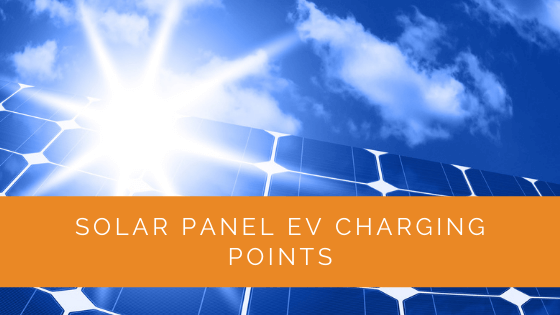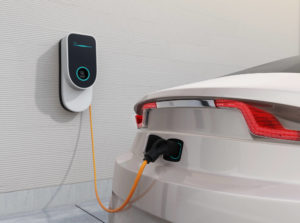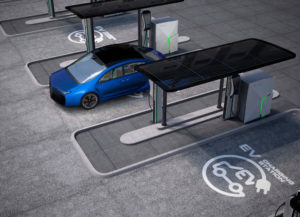Harnessing the sun’s power to charge your electric vehicle (EV) is a smart and sustainable choice that reduces your carbon footprint and saves you money in the long run. In this informative article, we will guide you through the essential aspects of using solar panels to charge your EV, ensuring you make an informed decision that suits your needs. Whether you’re new to the world of electric vehicles or considering upgrading your existing solar panel system, this guide will provide valuable insights and considerations to help you navigate the exciting world of solar panel EV charging.
Contents
- 1 Key Takeaways
- 2 Using Solar Panels to Charge Your EV
- 3 Should you Install a Solar EV Charging Point?
- 4 Factors to Consider for Choosing the Right Solar Inverter
- 5 Case Study: Implementing Solar Panel EV Charging for a Residential Property
- 6 Expert Insights From Our Solar Panel Installers About Solar Panel EV Charging Points
- 7 Discover the Power of Solar with Solar Panels Network
- 8 Final Thoughts
Key Takeaways
- Using solar panels to charge your electric vehicle (EV) is an environmentally friendly and cost-effective choice that can significantly reduce your carbon footprint while saving you money in the long run.
- Considerations such as the number of solar panels required, the size of your EV’s battery, and charging times are essential to tailor your solar charging system to your specific needs effectively.
- Solar inverters play a crucial role in converting solar energy into usable power for your EV, and choosing the right one is essential for optimal performance and durability.
Using Solar Panels to Charge Your EV
Firstly, you will need a home charging unit to use solar panels for charging your EV. You can also avail a PV inverter unit to store and convert solar energy into usable electricity.
Solar panels charge your EV the same way they charge any other home appliance. You can even charge your vehicle at night using domestic solar battery storage energy. You also have the option to charge directly with your solar PV system, but you will need to be at home for that.
Solar charging systems for EVs are readily available in the market. However, no dedicated standalone panel is available yet for charging cars specifically.
So, where do you look for these separate parts? You need to understand that the National Grid provides the electricity for running these environment-friendly cars. Therefore, solar panel systems are the right choice if you plan to reduce your carbon footprint.
It would be best to remember a few things before choosing a solar panel for EV charging.

1. The Number of Panels
The energy required to charge depends upon the battery size of your EV. Therefore, there can be no single estimate for the number of panels needed.
For a better understanding, let’s take the standard Tesla S model, for instance. It has a battery capacity of 75 kWh.
A standard 250-watt solar panel can produce 30-42.5 kWh of AC monthly. On average, a low-end solar panel produces 1 kWh of AC electricity daily. That means you would need around 75 solar panels to power up your Tesla Model S to total capacity from zero charge in a day.
Now, the average person commutes for up to 37 miles. This means you will need 12 kWh of power daily.
Therefore, it is recommended to go for a panel system with at least 10-12 solar panels. But this is only the lowest estimate.
It is very easy to find systems with 25-30 panels. This should give you enough power to keep your EV charged for a day. Of course, you will need more panels if your car has a larger battery.
2. The Size of your EV
Besides the number of panels, your car’s size and battery also determine the power you need. Electric vehicles’ battery capacity can range between 20 and 100 kWh.
Of course, some luxury versions have a bigger battery capacity than that. A basic chart explains the relationship between battery capacity and vehicle size.
| Vehicle Types | Battery Capacity (kWh) | Standard Range (Miles) |
|---|---|---|
| Subcompact Cars | 30-35kWh | 99 miles |
| Mid-Sized Sedan | 40-65 kWh | 155 miles |
| Luxury Tesla Model | 65+ kWh | 375-mile range |
3. Charging Time
Depending on the battery size, EVs can take 30 minutes to more than 12 hours to get fully charged. Charging time also depends upon how fast the charging point is.
Here is a guideline to give you a better idea about the capacity of public EV charging stations.
| Public EV Charging Station Type | Charging Speed |
|---|---|
| Public Fast Charging (Level 3) | Level 3 is a fast-charging process. The DC power is converted much faster in this and requires a different type of equipment. Therefore, the systems in the charging stations are more costly and complex. |
| Public Slow Charging (Level 2) | The Level 2 charging is slower in contrast since AC is used here. The average speed of this can vary between 3kWh and 22kWh, based on the EVSE (Electric Vehicle Service Equipment). |
So you can understand how important it is for you to pay attention to the specifications of your panel.
Charging your vehicle overnight is the best option for those with slow-charging cars. A battery charge unit will give you long-term benefits in more ways than you think.
Note: With a high-capacity solar panel, you can generate enough energy to power your car and house, which saves money on energy and fuel.
4. Solar Inverters
Solar inverters are crucial for generating solar energy that you can use later.
However, you need to understand that solar energy does not work like electricity. Special inverters need to be installed that convert the energy created by the solar panels into usable energy.
Are you wondering how that works?
Your home and all appliances run on alternating current (AC). Solar panels, on the other hand, produce direct current (DC). Inverters act as a medium by transforming the DC power into usable AC power.
If you have used a rooftop solar system before, you know how vital solar inverters are.
There are three types of solar inverters:
- Micro-Inverters: You can easily increase the system size and optimise the power output independently.
- Power Optimisers: Each panel output is controlled separately, and you may need an additional central inverter if the power requirement rises.
- String Inverters: These are the simplest to maintain, highly durable, and cost-effective. They are also the most common in use.

Should you Install a Solar EV Charging Point?
Before you invest in a home charging station, you may wonder about its utility. You must understand how solar panel charging happens domestically compared to public charging stations.
Charging EVs at Public Stations: Public infrastructure is the best for someone who enjoys long drives on weekends and needs fast charging. If you live in a neighbourhood near a station or travel close to one, go for it.
Unfortunately, there are still not enough charging points available. Therefore, relying entirely on these can be hectic.
Charging EVs at Home: In contrast, investing in a home charging station gives you more flexibility and convenience for EV charging. On a quick look, it may seem to be an expensive option, but factors like energy cost and consumption make it great in the long run.
If you travel long distances regularly, then making this investment is wise.
Factors to Consider for Choosing the Right Solar Inverter
Once you decide to invest in a home solar panel system, you need to know which solar inverter fits your requirements the best. Here are a few factors that will help you make an informed decision.
- Operating Temperature: Inverters are usually exposed to the outdoor environment and must be durable. Getting an inverter with a higher operating temperature ensures that it will not malfunction under extreme heat.
- Efficiency: Regarding solar inverters, we need to consider two types of efficiencies- weighted and peak. While peak efficiency ensures optimal performance, weighted efficiency can estimate variables like DC input levels. Therefore, choosing the latter is better against natural elements, like the weather.
- Warranty: Like any other appliance, your solar device has a warranty. With most inverters, you can expect to get a warranty between 5-10 years. However, there are some options with an extended 25-year warranty. It is better to purchase products with a more extended warranty.
- Clipping or Scalping: The energy lost when a solar panel supplies more DC power than its maximum power rating. Thus, you must choose the right size, type, and inverter model to avoid excess clipping.

Case Study: Implementing Solar Panel EV Charging for a Residential Property
Background
A homeowner in the outskirts of London sought to install a solar panel system capable of charging their electric vehicle (EV). The primary goal was to reduce electricity costs and reliance on the grid while taking advantage of the UK’s incentives for renewable energy adoption. The homeowner’s EV had a battery capacity of 75 kWh, and they commuted an average of 40 miles daily, requiring approximately 12 kWh per day.
Project Overview
The project aimed to design and implement a solar panel system that could efficiently charge the homeowner’s EV and power essential home appliances. The system needed to be scalable to accommodate future increases in energy demand, such as the addition of more EVs or other electric devices.
Implementation
- Needs Assessment: We assessed the homeowner’s daily energy requirements, focusing on the EV’s charging needs and the household’s overall energy consumption. This assessment helped determine the optimal number of solar panels and the system’s capacity.
- System Design: Based on the assessment, we recommended a system comprising 20 high-efficiency monocrystalline solar panels, each with a capacity of 400 watts. This setup was chosen for its ability to generate sufficient power, even on cloudy days, and for its compact footprint, which was ideal for the available roof space.
- Inverter and Battery Storage: To ensure maximum efficiency and energy storage, we installed a hybrid inverter and a 10 kWh battery storage system. The hybrid inverter converts the DC power generated by the panels into AC power for immediate use or storage in the battery. The battery storage allows for charging the EV during the night or on days with less sunlight.
- Installation and Optimisation: The solar panels were installed with an optimal tilt and orientation to maximise sunlight exposure throughout the year. We also provided the homeowner with a monitoring system to track energy production and consumption, ensuring the system operated efficiently.
Results
- Energy Independence: The system provided sufficient power to charge the EV and meet the household’s energy needs. The homeowner reported a significant reduction in electricity bills, as they could now charge their EV using solar power rather than grid electricity.
- Cost Savings: By utilising solar energy, the homeowner saved significantly on fuel and electricity costs. The investment in the solar panel system was projected to pay off within seven years, after which the savings would directly contribute to household income.
- Environmental Benefits: The use of solar panels and a battery storage system reduced the homeowner’s carbon footprint. By relying on renewable energy for their EV and home, they significantly decreased their dependence on fossil fuels.
- Scalability and Future Proofing: The system was designed with scalability in mind, allowing for additional panels or battery storage to be added as needed. This flexibility ensures that the homeowner can accommodate future energy demands.
Summary
This case study demonstrates the practical and financial benefits of integrating a solar panel system for EV charging at a residential property. By carefully assessing energy needs and implementing a well-designed system, the homeowner achieved energy independence and significant cost savings. At Solar Panels Network, we are committed to providing tailored solar solutions that meet our clients’ specific needs, helping them embrace renewable energy and reduce their environmental impact. This project underscores our expertise in delivering high-quality solar installations and supporting sustainable energy transitions.
Expert Insights From Our Solar Panel Installers About Solar Panel EV Charging Points
Charging your electric vehicle (EV) using solar panels is an efficient and environmentally friendly solution. Not only does it reduce your reliance on the grid, but it also lowers your carbon footprint. The key is to ensure that your solar panel system is appropriately sized to meet your EV’s energy needs.
Senior Solar Installer
Choosing the right solar inverter is critical for converting the DC power generated by your solar panels into the AC power your EV requires. Different types of inverters, such as micro-inverters and string inverters, offer various benefits, including system efficiency and scalability.
Renewable Energy Consultant
It’s essential to consider both the number of solar panels and the capacity of your EV’s battery when setting up a solar charging system. Proper planning ensures that your vehicle is adequately charged, even on days with less sunlight, by possibly integrating battery storage solutions.
Lead Solar Technician
Discover the Power of Solar with Solar Panels Network
Are you navigating the world of solar installations? Look no further than Solar Panels Network, the UK’s trusted partner in harnessing the sun’s potential. Our dedication goes beyond just installations; we’re on a mission to transform how homeowners and businesses across the UK perceive and utilise energy. By choosing us, you’re reducing your carbon footprint and making a smart financial move that promises savings for years ahead. Contact us today and embark on your solar journey.
Final Thoughts
Driving an EV in a city like London exempts you from Congestion Charge or ULEZ Charge. There are plenty of other benefits to driving an environment-friendly car like this. With the growing environmental concerns and the inflated need to take cleaner steps, EVs can become an everyday utility.
The shortage of charging points is a reality, though. Having a solar panel set up in your home can be beneficial in reducing unpredictability. All you need to do is calculate your power consumption and compare the options before jumping.
You may worry about the increasing energy costs of the future regarding your electric car or otherwise. Therefore, installing solar panels is convenient for charging your EV and can be a lifetime investment.
Doing a bit of research and comparing different products can help you immensely. You can also refer to this guide if you feel stuck at any step.
Get your solar panel EV charging system today!
About the Author
Solar Panels Network stands at the forefront of solar energy solutions, driven by a team of seasoned solar engineers and energy consultants. With over decades of experience in delivering high-quality solar installations and maintenance, we are committed to promoting sustainable energy through customer-centric, tailored solutions. Our articles reflect this commitment, crafted collaboratively by experts to provide accurate, up-to-date insights into solar technology, ensuring our readers are well-informed and empowered in their solar energy decisions.



